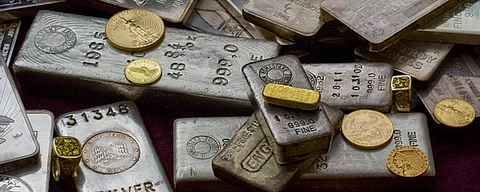
- Home
- NewsGram USA
- India
- न्यूजग्राम
- World
- Politics
- Opinion
- Entertainment
- On Ground
- Culture
- Lifestyle
- Economy
- Sports
- Sp. Coverage
- Misc.
- NewsGram Exclusive
- Jobs / Internships
- Interview

People have always been fascinated by gold, silver, and other shiny things. Owning an item made of precious metals has always been prestigious. That belief has not changed even today, although precious metals get attention on a whole new level.
Today, precious metals are a valued investment vehicle. They are an excellent way to invest using trusted partners (you can check Lear Capital rating to see why they are a good choice). That's just one of the reasons why financial experts look favorably at these assets. But before making a final decision, it is good to know the relevant pros and cons of investing in these valuable assets.
Protection against Inflation
Inflation is a massive threat to any economy, but precious metals are a relatively safe investment. Their value doesn't fluctuate as much as stock markets do. Nor do they lose their value like paper money. As a result, they can protect you from the worst effects of an economic downturn.
Moreover, precious metals will hold their value over time. Of course, inflation may increase the price of these assets. Still, their value will never fall below the price you paid for them. In fact, it can only increase or, in the worst case, stay the same.
You can use historical price charts to compare the prices of different metals. These will show you the price of an ounce of gold, silver, and platinum over a specified period. Again, you'll notice a steady value growth, primarily due to increased demand.
Portfolio Diversification
Some would say that gold and silver have mixed records as inflation hedges. But these are still good places to diversify an investment portfolio. Some investment advisers recommend a small percentage of your portfolio in these assets to protect it from inflation.
Having some gold in your portfolio allows you to be more risk-averse. You can invest in riskier vehicles like cryptocurrencies and high-yield bonds. That way, you have a chance of gaining a profit while precious metals protect your portfolio and you against complete fund loss.
Demand on the Rise
Precious metals are a sought-after investment vehicle, but they're also a valuable industrial resource. Gold, silver, and platinum are used to produce high-tech products and are in high demand by consumers and businesses. They also have their purposes in medicine and the pharmaceutical industry.
As the global population grows, there will be increased demand for commodities like computers and other tech gadgets. That means industries will need more gold, silver, platinum, and palladium. Unfortunately, their mining and processing are not easy, so increased demand will lead to a possible shortage of these resources. That will almost certainly mean an increase in their prices.
On the following page, you can read about precious metal industrial usage:
Tangible Assets
This one can be seen as both pros and cons. On the good side, you can always keep an eye on tangible assets and store them in a safe place. Furthermore, no one can hack your gold or erase it from the hardware.
On the other hand, that can be a problem. For example, if you brag about owning a collection of rare gold coins, you can be an easy target for thieves. Also, you may have problems storing these assets, especially if you hold them as a part of your gold IRA.
Capital Gain Taxes
If you are interested in investing in precious metals, you may want to know about capital gain taxes. The IRS treats gold, silver, and other valuable metals as capital assets. That's why you have to pay capital gain taxes, but only after you sell your holdings or keep them for more than one year.
Your precious metal assets won't earn you passive income or interest. But holding them in your IRA can bring long-term benefits. Plus, this account is tax-deferred, meaning you don't pay taxes on your contributions and gains. Once you retire, you'll pay taxes on IRA distributions (or lump sum if you decide to withdraw all funds at once).
Storage and Insurance Costs
There are two main costs to consider when holding precious metals: storage and insurance. Storage costs mean you have to provide a quality strongbox for your assets at home or store them in certified depositories. Unfortunately, the first option is not always a good idea, as explained here.
Insurance costs can also be expensive, especially if you hold precious metals in bars. You have to protect yourself in case of burglary and asset theft. Private depositories also provide insurance for assets kept in their storage. But this service will be an extra charge for you. So you have to factor these expenses into your investment strategy.
Investing in precious metals can help protect your wealth when the economy is in trouble. While it's true that these assets don't offer passive income, they can provide you with daily liquidity and long-term portfolio stability.
